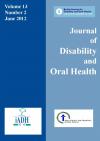Journal of Disability and Oral Health

- Cover Date:
- June 2012
- Print ISSN:
- 1470-855
- Vol:
- 13
- Issue:
- 2
Editorial - The impact of national policies on Special Care Dentistry
Editorial - The impact of national policies on Special Care Dentistry
The role of the Community Dental Service (CDS) in the United Kingdom (UK) has over many years been to meet the needs of those that other dental services do not reach (Department of Health, 1989). Until the late nineties the funding for CDS was sourced separately to that for General Dental Services (GDS), but in recent years there has been much mixing between the two. The prime minister’s pledge on dental access in 1999 brought GDS money to the CDS. Later, the 2006 dental contract in England and Wales introduced patient charges and Units of Dental Activity (UDA) for traditional CDS patients; and also local commissioning of the GDS. Throughout this period availability of National Health Service (NHS) dental services in the GDS has at times been poor in many parts of the country, increasing the need for salaried services to see patients from outside their traditional special care remit, and impacting on their ability to meet the needs of their vulnerable patients. There have also been many instances across the UK of commissioners not understanding the complexity of treating special care groups, of them comparing CDS costs with those of the GDS and cutting CDS budgets and services. Health care services in the UK are continually influenced by demographic and political change, leading to new policies and priorities. Special Care Dentistry (SCD) is not immune from such change. Our leading clinicians and the specialist societies need to embrace such change but at the same time ensure that the needs of our patients are protected, and lobby hard when a policy which may make sense for the majority has a negative impact on our ability to care for the most vulnerable. The NHS in England is currently piloting a primary dental care contract based on registration, capitation and quality. While the removal of UDA targets is to be welcomed this new system could bring equal challenges to those providing special care services. A higher capitation rate will be needed to reflect the costs of providing SCD, but with this comes a danger that this rate will attract those who have neither the facilities nor skills to treat such patients. Similarly, quality targets based on outcome measures using a red, amber, green (RAG) rating of oral health may not be appropriate for some special care patients. The British Dental Association (BDA) is now in discussions with the Department of Health (DoH) regarding piloting the capitation model in salaried services.
- Article Price
- £15.00
- Institution Article Price
- £
- Page Start
- 43
- Page End
- 44
- Authors
- Peter Bateman
Articles from this issue
- Title
- Pg. Start
- Pg. End
- The oral health experiences of children with learning disabilities in special schools in Sheffield
- 45
- 50
- Access to dental care for persons with disabilities in Saudi Arabia (Caregivers’ perspective)
- 51
- 61
- Evaluation of a mechanical stretching device, the TheraBite®, in patients with restricted maximal mouth opening and neuromuscular disorders: a case series
- 71
- 75
